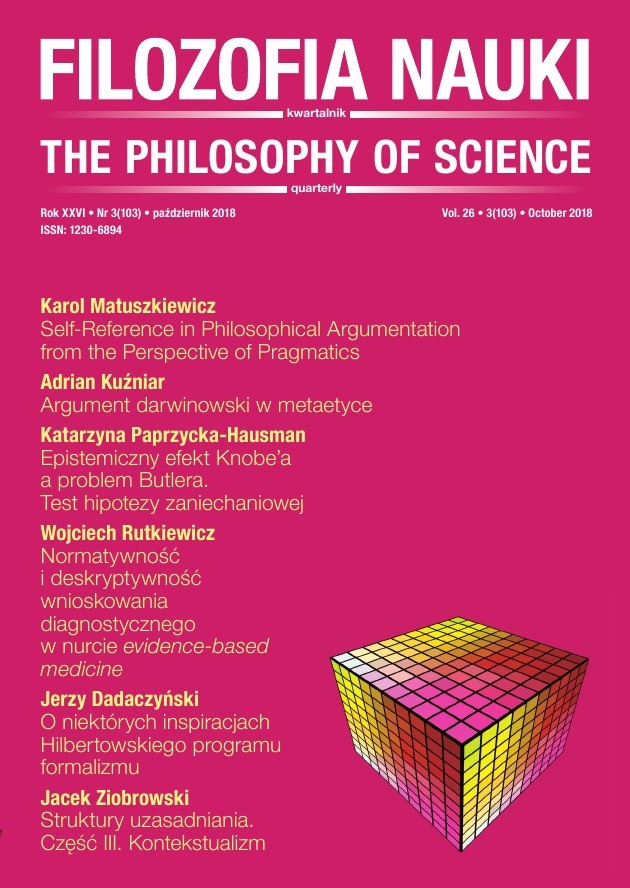Self-Reference in Philosophical Argumentation from the Perspective of Pragmatics
DOI:
https://doi.org/10.14394/filnau.2018.0015Słowa kluczowe:
argumentation, self-reference, pragmatics, Liar paradoxAbstrakt
This paper argues that pragmatics can yield interesting insights into the nature of paradoxes of self-reference. These insights help us understand that self-referential questions in philosophy do not necessarily lead to antinomy. First, the article summarizes the results of the traditional, formal-semantic approach to antinomies and determines which kind of attempts at resolving them has led philosophers to reject all self-referential sentences as nonsensical. Next, it presents two pragmatically-oriented attempts at solving the Liar paradox. Critical examination of these attempts makes it possible to distill the specific features of the pragmatic approach and to use these features in an analysis of several self-referential utterances. Accordingly, the paper proposes a classification of pragmatic self-reference, which is then used to analyze the argument from self-referential inconsistency against skepticism. The paper closes with a summary emphasizing that, in light of pragmatic analysis, self-referential arguments in philosophy are not affected by paradox, which shows that the inadmissibility thesis is unjustified.
Bibliografia
Haack S. (1978), Philosophy of Logics, Cambridge: Cambridge University Press. https://doi.org/10.1017/CBO9780511812866
Herzberger H. G. (1982), "Naïve Semantics and the Liar Paradox," The Journal of Philosophy 79(9), 479-497. https://doi.org/10.2307/2026380
Kripke S. (1975), "Outline of a Theory of Truth," The Journal of Philosophy 72(19), 690-716. https://doi.org/10.2307/2024634
Mackie J. L. (1973), Truth, Probability, and Paradox: Studies in Philosophical Logic, Oxford: Clarendon Press.
Martinich A. P. (1983), "A Pragmatic Solution to the Liar Paradox," Philosophical Studies 43(1), 63-67. https://doi.org/10.1007/BF01112522
Popper K. (1954), "Self-Reference and Meaning in Ordinary Language," Mind 63(250), 162-169.
https://doi.org/10.1093/mind/LXIII.250.162
Priest G. (1979), "The Logic of Paradox," Journal of Philosophical Logic 8(1), 219-241.
https://doi.org/10.1007/BF00258428
Russell B., Whitehead A. (1925), Principia Mathematica, Cambridge: Cambridge University Press.
Ryle G. (1950), "Heterologicality," Analysis 11(3), 61-69. https://doi.org/10.1093/analys/11.3.61
Scofield C. I., Rikkers D. W. (2002), The Scofield Study Bible: New King James Version, New York, NY: Oxford University Press.
Searle J. (1969), Speech Acts: An Essay in the Philosophy of Language, Cambridge: Cambridge University Press. https://doi.org/10.1017/CBO9781139173438
Stroll A. (1988), "The Liar: What Paradox?," Argumentation 2(1), 63-75. https://doi.org/10.1007/BF00179141
Tarski A. (1956), The Concept of Truth in Formalized Languages [in:] Logic, Semantics, Metamathematics: Papers from 1923 to 1938, J. H. Woodger (trans.), Oxford: Clarendon Press, 152-278.
van Fraassen B. C. (1968), "Presupposition, Implication, and Self-Reference," The Journal of Philosophy 65(5), 136-152. https://doi.org/10.2307/2024557
Whewell D. A. (1987), Self-Reference and Meaning in a Natural Language [in:] Self-Reference — Reflections on Reflexivity, S. J. Bartlett, S. Suber (eds.), Dordrecht: Martinus



















 Filozofia Nauki | ISSN 1230-6894 | e-ISSN 2657-5868
Filozofia Nauki | ISSN 1230-6894 | e-ISSN 2657-5868